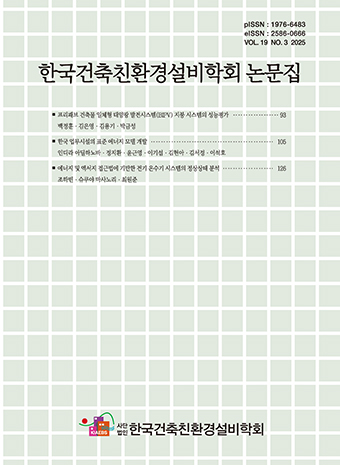Research Article
Afroz, Z., Gunay, H.B., O'Brien, W., Newsham, G., Wilton, I. (2021). An inquiry into the capabilities of baseline building energy modelling approaches to estimate energy savings. Energy and Buildings, 244, 111054. DOI: https://doi.org/10.1016/j.enbuild.2021.111054
10.1016/j.enbuild.2021.111054Díaz, J.A., Ramos, J.S., Delgado, M.C.G., García, D.H., Montoya, F.G., Domínguez, S.Á. (2018). A daily baseline model based on transfer functions for the verification of energy saving. A case study of the administration room at the Palacio de la Madraza, Granada. Applied Energy, 224, 538-549. DOI: https://doi.org/10.1016/j.apenergy.2018.04.060.
10.1016/j.apenergy.2018.04.060Jung, Y.W., Kim, J.Y., Kim, J.U. (2020). Optimal Selection of Energy Baseline Through Analysis of Electrical Energy Consumption Statistics and Influence Factors of Office Buildings. Journal of Korean Institute of Architectural Sustainable Environment and Building Systems, 14(6), 601-612.
Kim, Y.M. (2021). Greenhouse Gas Reduction Targets for 2050 and Policy Instruments for Carbon Neutrality in the Building Sector. KRIHS, 479.
Kwak, R.Y. (2008). Questionnaire survey & Evaluation for Quality Level of Energy Management System in Buildings. Journal of the Architectural Institute of Korea Planning & Design, 24(12), 353-360.
Qaisar, I., Zhao, Q. (2022). Energy baseline prediction for buildings: A review. Results in Control and Optimization, 7, 100129. DOI: https://doi.org/10.1016/j.rico.2022.100129.
10.1016/j.rico.2022.100129Sarmas, E., Forouli, A., Marinakis, V., Doukas, H. (2024). Baseline energy modeling for improved measurement and verification through the use of ensemble artificial intelligence models. Information Sciences, 654, 119879, DOI: https://doi.org/10.1016/j.ins.2023.119879
10.1016/j.ins.2023.119879Seong, N.C., Hong, G.P. (2022). An Analysis of the Effect of the Data Preprocess on the Performance of Building Load Prediction Model Using Multilayer Neural Networks. Journal of Korean Institute of Architectural Sustainable Environment and Building Systems, 16(4), 273-284.
Srivastav, A., Tewari, A., Dong, B. (2013). Baseline building energy modeling and localized uncertainty quantification using Gaussian mixture models. Energy and Buildings, 65, 438-447. DOI: https://doi.org/10.1016/j.enbuild.2013.05.037.
10.1016/j.enbuild.2013.05.037Wi, Y.M. (2017). A Study on the Baseline Load Estimation Method using Heating Degree Days and Cooling Degree Days Adjustment. The Transactions of the Korean Institute of Electrical Engineers, 66(5), 745-749.
10.5370/KIEE.2017.66.5.745Yoon, Y.R., Lee, M.H., Moon, H.J. (2018). Comparison of Building Energy Prediction Models based on Machine Learning Algorithms for Hourly M&V Baseline. The Korean Society of Living Environmental System, 25(5), 595-602.
10.21086/ksles.2018.10.25.5.595Cho, J.K. (2020). A Study on Evaluation Methodologies of Energy Efficiency Rating for Data Centers. 2020 SAREK Winter Annual Conference, 376-379.
- Publisher :Korean Institute of Architectural Sustainable Environment and Building Systems
- Publisher(Ko) :한국건축친환경설비학회
- Journal Title :Journal of Korean Institute of Architectural Sustainable Environment and Building Systems
- Journal Title(Ko) :한국건축친환경설비학회논문집
- Volume : 18
- No :2
- Pages :109-121
- Received Date : 2024-02-26
- Revised Date : 2024-04-07
- Accepted Date : 2024-04-18
- DOI :https://doi.org/10.22696/jkiaebs.20240010




 Journal of Korean Institute of Architectural Sustainable Environment and Building Systems
Journal of Korean Institute of Architectural Sustainable Environment and Building Systems








